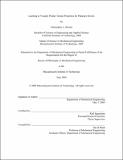| dc.contributor.advisor | Karl Iagemma. | en_US |
| dc.contributor.author | Brooks, Christopher Allen, 1978- | en_US |
| dc.contributor.other | Massachusetts Institute of Technology. Dept. of Mechanical Engineering. | en_US |
| dc.date.accessioned | 2009-11-06T14:51:34Z | |
| dc.date.available | 2009-11-06T14:51:34Z | |
| dc.date.copyright | 2009 | en_US |
| dc.date.issued | 2009 | en_US |
| dc.identifier.uri | http://hdl.handle.net/1721.1/49557 | |
| dc.description | Thesis (Ph. D.)--Massachusetts Institute of Technology, Dept. of Mechanical Engineering, 2009. | en_US |
| dc.description | This electronic version was submitted by the student author. The certified thesis is available in the Institute Archives and Special Collections. | en_US |
| dc.description | Includes bibliographical references (p. 174-180). | en_US |
| dc.description.abstract | For future planetary exploration missions, improvements in autonomous rover mobility have the potential to increase scientific data return by providing safe access to geologically interesting sites that lie in rugged terrain, far from landing areas. This thesis presents an algorithmic framework designed to improve rover-based terrain sensing, a critical component of any autonomous mobility system operating in rough terrain. Specifically, this thesis addresses the problem of predicting the mechanical properties of distant terrain. A self-supervised learning framework is proposed that enables a robotic system to learn predictions of mechanical properties of distant terrain, based on measurements of mechanical properties of similar terrain that has been previously traversed. The proposed framework relies on three distinct algorithms. A mechanical terrain characterization algorithm is proposed that computes upper and lower bounds on the net traction force available at a patch of terrain, via a constrained optimization framework. Both model-based and sensor-based constraints are employed. A terrain classification method is proposed that exploits features from proprioceptive sensor data, and employs either a supervised support vector machine (SVM) or unsupervised k-means classifier to assign class labels to terrain patches that the rover has traversed. A second terrain classification method is proposed that exploits features from exteroceptive sensor data (e.g. color and texture), and is automatically trained in a self-supervised manner, based on the outputs of the proprioceptive terrain classifier. | en_US |
| dc.description.abstract | (cont.) The algorithm includes a method for distinguishing novel terrain from previously observed terrain. The outputs of these three algorithms are merged to yield a map of the surrounding terrain that is annotated with the expected achievable net traction force. Such a map would be useful for path planning purposes. The algorithms proposed in this thesis have been experimentally validated in an outdoor, Mars-analog environment. The proprioceptive terrain classifier demonstrated 92% accuracy in labeling three distinct terrain classes. The exteroceptive terrain classifier that relies on self-supervised training was shown to be approximately as accurate as a similar, human-supervised classifier, with both achieving 94% correct classification rates on identical data sets. The algorithm for detection of novel terrain demonstrated 89% accuracy in detecting novel terrain in this same environment. In laboratory tests, the mechanical terrain characterization algorithm predicted the lower bound of the net available traction force with an average margin of 21% of the wheel load. | en_US |
| dc.description.statementofresponsibility | by Christopher A. Brooks. | en_US |
| dc.format.extent | 210 p. | en_US |
| dc.language.iso | eng | en_US |
| dc.publisher | Massachusetts Institute of Technology | en_US |
| dc.rights | M.I.T. theses are protected by
copyright. They may be viewed from this source for any purpose, but
reproduction or distribution in any format is prohibited without written
permission. See provided URL for inquiries about permission. | en_US |
| dc.rights.uri | http://dspace.mit.edu/handle/1721.1/7582 | en_US |
| dc.subject | Mechanical Engineering. | en_US |
| dc.title | Learning to visually predict terrain properties for planetary rovers | en_US |
| dc.type | Thesis | en_US |
| dc.description.degree | Ph.D. | en_US |
| dc.contributor.department | Massachusetts Institute of Technology. Department of Mechanical Engineering | |
| dc.identifier.oclc | 456736151 | en_US |

